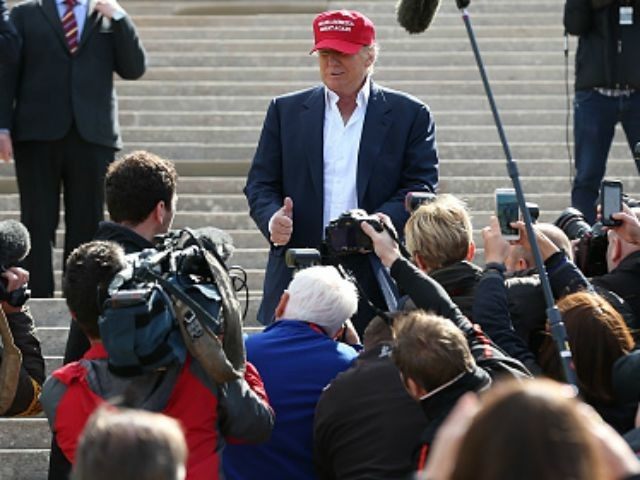On Tuesday’s Breitbart News Daily, SiriusXM host Matt Boyle asked Robert Costa of the Washington Post why Donald Trump’s election took so much of the “legacy media” by surprise.
“There are so many factors,” Costa replied, “but I think it starts with, you have to listen to voters, and you have to have an open mind when you listen to voters.”
“So often I would meet people, and they would say, ‘Oh, I’m for Hillary.’ And then I’d dig a little deeper, and scratch the surface, and you’d realize they weren’t really for Secretary Clinton. They were kind of undecided. They wanted change,” he recalled.
“I just kept meeting all these voters who wanted change – kind of radical change, change that was not just about getting a different person in there, or about getting a different party in there,” he continued. “They would believe the whole system – economic, culture, political – was kind of sick and corrupt. These were people who weren’t really hard-edged or fully engaged, but they just wanted change.”
“That desire for change really ends up being a desire for populism, a desire for some kind of new leadership,” Costa suggested.
He saw a few differences between the current populist movement and previous voter rebellions.
“One, the breakdown over globalization,” he said. “It’s so deep, and so widely felt. People are so, really, kind of wary of what’s happening with the global economy. And I don’t think that’s been reflected fully in the media. Politicians haven’t seemed really to take it up. But when you and I are out on the campaign trail, we encounter that.”
“The other issue I think that’s always been somewhat under-covered is immigration,” Costa continued. “You look at David Brat against Eric Cantor in 2014. You look at the response to the immigration bill in 2013. You see immigration. It’s not so much about keeping out [a] certain … ethnic group, or this or that. It was about nationalism. It was about people wanting to protect what they see as national identity.”
“I really tried to capture that in my reporting. I think immigration is just the driving issue behind it. People see their country changing. Jeff Sessions, who was always kind of a gadfly in the Senate, was really at the heart of this, identifying immigration as something that connected with people’s anxieties. He seized on that, and then Trump came in, in 2015, and really took off with Jeff Sessions’ playbook and made it his own,” Costa said.
Boyle asked what all media, from legacy publications to Breitbart News, could do to “learn the right lessons from this, moving forward.”
“Well, I think these terms have to be clearly defined,” Costa suggested, “because there’s such a blurry discussion right now about what all these things mean. Breitbart is linked to the so-called ‘alt right,’ and then it’s sometimes linked to, you know, kind of hate. We see this whole controversy this week over white nationalists coming to Washington, D.C., and it’s been linked to Donald Trump. Trump has come out with a statement saying he denounces all kinds of racism, but it’s still being linked to Trump.”
“I think what’s happened with the populism that’s really growing in this country, the populism/nationalism, is that it hasn’t been fully defined away from the fringe,” he ventured. “I think that’s a challenge for it in the next four years, in the Trump era. Even though [he] has, in a sense, won the majority of the country, winning the presidency, it still hasn’t found a way to disassociate itself from some of these fringe elements. That’s kind of a confusion that’s out there for a lot of people. You see that in the press coverage. I think that’s something that has to change, if it’s going to be successful as a political movement.”
“Trump is so different in the way he makes decisions. He’s non-traditional, and I think we’re going to see some non-traditional picks for this Cabinet, in a way that maybe cuts into the Democratic base,” Costa predicted. “Maybe a Tulsi Gabbard, the Democratic congresswoman who has supported Sanders. Maybe she could come in and be something like U.N. ambassador. I think at State we could see someone like Mitt Romney, perhaps. But this is a Cabinet that’s going to be eclectic. You’re going to have Establishment on some levels, but you’re also going to have Jeff Sessions, and maybe Kris Kobach, making sure immigration policy is fully enforced.”
“You’re going to have all these different kinds of voices. It’s just so different. It’s hard to define. Trump’s not easily defined, and people, I think, hate that sometimes: ‘Oh, he’s going full Establishment. He’s going full populist.’ He really is not doing either. He’s doing his own thing,” Costa said.
Breitbart News Daily airs on SiriusXM Patriot 125 weekdays from 6:00 a.m. to 9:00 a.m. Eastern.
LISTEN:

COMMENTS
Please let us know if you're having issues with commenting.